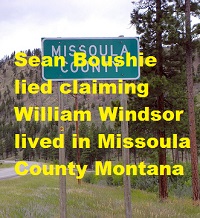 |
On August 13, 2013, Sean Boushie signed a sworn affidavit before a notary, and he swore that Bill Windsor resided in Missoula County Montana. The false sworn affidavit was used to get William M. Windsor arrested and jailed for 134 days.
This article provides evidence that law enforcement needs to establish that Sean Boushie should be charged with false swearing, perjury, and filing a false police report...
CRIMINAL CHARGE AGAINST SEAN BOUSHIE: On August 13, 2013, Sean Boushie signed a sworn affidavit before a notary public as part of his Petition for Temporary Order of Protection. In the sworn affidavit, he stated that William M. Windsor resided in Missoula County Montana.
This is false as Sean Boushie admitted in a letter that he attached to his sworn petition.
EVIDENCE SUPPORTING THE CRIMINAL CHARGE AGAINST SEAN BOUSHIE:
On Page 6 of Sean Boushie’s Petition for Temporary Order of Protection dated August 13, 2013, Sean Boushie states that William M. Windsor is a legal resident of Marietta Georgia or Box Elder South Dakota. Yet on Page 1 of the Petition, he falsely claims William M. Windsor lives in Missoula, Montana. He claimed Bill Windsor lived in Missoula so Ravalli County resident Sean Boushie could qualify for a Missoula County Montana protective order.
Proof of William M. Windsor’s residence was on file in the Missoula Municipal Court where Sean Boushie filed his perjured affidavit as Bill Windsor had previously attempted to obtain a temporary order of protection against Sean Boushie. This Missoula Municipal Court Petition shows his address in South Dakota as does the Petition that he filed in Ravalli County.
MONTANA STATUTES VIOLATED:
45-7-202. False swearing. (1) A person commits the offense of false swearing if the person knowingly makes a false statement under oath or equivalent affirmation or swears or affirms the truth of a statement previously made when the person does not believe the statement to be true and:
(a) the falsification occurs in an official proceeding;
(b) the falsification is purposely made to mislead a public servant in performing an official function; or
(c) the statement is one that is required by law to be sworn or affirmed before a notary or other person authorized to administer oaths.
(2) Subsections (4) through (7) of 45-7-201 apply to this section.
(3) Except as provided in 13-35-240, a person convicted of false swearing shall be fined an amount not to exceed $500 or be imprisoned in the county jail for a term not to exceed 6 months, or both.
45-7-201. Perjury. (1) A person commits the offense of perjury if in any official proceeding the person knowingly makes a false statement under oath or equivalent affirmation or swears or affirms the truth of a statement previously made when the statement is material.
(2) A person convicted of perjury shall be punished by imprisonment in the state prison for any term not to exceed 10 years or be punished by a fine of not more than $50,000, or both.
(3) Falsification is material, regardless of the admissibility of the statement under rules of evidence, if it could have affected the course or outcome of the proceeding. It is no defense that the declarant mistakenly believed the falsification to be immaterial. Whether a falsification is material in a given factual situation is a question of law.
(4) It is not a defense to prosecution under this section that the oath or affirmation was administered or taken in an irregular manner or that the declarant was not competent to make the statement. A document purporting to be made upon oath or affirmation at any time when the offender presents it as being so verified must be considered to have been sworn or affirmed.
(5) A person may not be guilty of an offense under this section if the person retracted the falsification in the course of the proceeding in which it was made before it became manifest that the falsification was or would be exposed and before the falsification substantially affected the proceeding.
(6) When the defendant made inconsistent statements under oath or equivalent affirmation, both having been made within the period of the statute of limitations, the prosecution may proceed by setting forth the inconsistent statements in a single count alleging in the alternative that one or the other was false and not believed by the defendant. In that case, it is not necessary for the prosecution to prove which statement was false but only that one or the other was false and not believed by the defendant to be true.
(7) A person may not be convicted of an offense under this section when proof of falsity rests solely upon the testimony of a single person other than the defendant.
45-7-205. False reports to law enforcement authorities. (1) A person commits an offense under this section if the person knowingly:
(a) gives false information to any law enforcement officer with the purpose to implicate another;
(b) reports to law enforcement authorities an offense or other incident within their concern knowing that it did not occur; or
(c) pretends to furnish law enforcement authorities with information relating to an offense or incident when the person knows that the person has no information relating to the offense or incident.
(2) A person convicted under this section shall be fined not to exceed $500 or be imprisoned in the county jail for any term not to exceed 6 months, or both.
WHAT THE MISSOULA POLICE DEPARTMENT NEEDS TO DO TO HAVE NEEDED EVIDENCE:
1. Read Sean Boushie’s Petition for Temporary Order of Protection.
2. Review any of William M. Windsor’s court filings. Ravalli County Petition — Missoula Municipal Court Petition
Photo copyright Newstalk KVGO